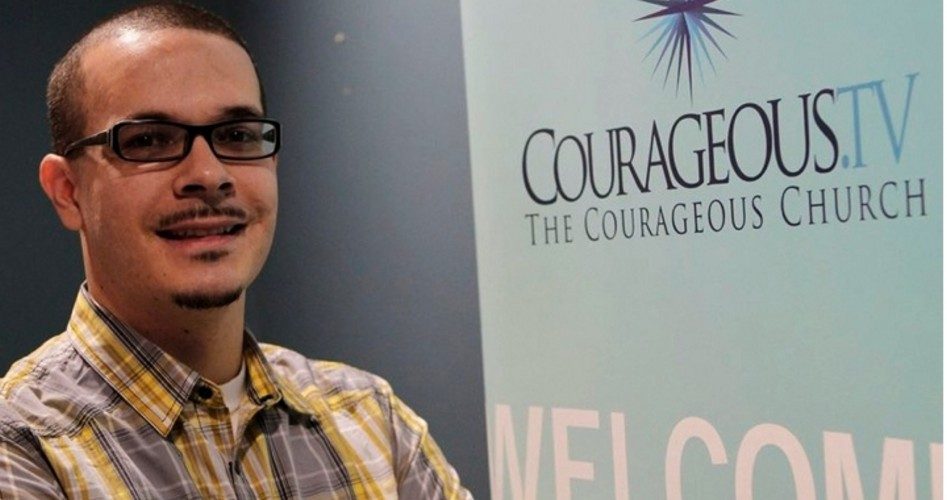
First there was Rachel Dolezal, the white woman who’d masqueraded as black well enough to become head of an NAACP chapter. Now there’s an accusation that a “black” activist with “media darling” the Black Lives Matter (BLM) movement also is a BINO (black in name only). Writes Breitbart, reporting on an investigation by blogger Vicki Pate:
An investigative blogger has accused Shaun King, a key figure in the Black Lives Matter movement, of misleading media icon Oprah Winfrey by pretending to be biracial in order to qualify for an “Oprah scholarship” to historically black Morehouse College. The blogger says King is white and has been lying about his ethnicity for years.
King is a high-profile campaigner against “police brutality” and “justice correspondent” for the liberal Daily Kos website who told Rebel magazine in 2012 that he was biracial, with the magazine reporting that he is the “son of a Caucasian mother and an African-American father.” He has also described himself as “mixed with a black family” on Twitter.
King has been lionised by the press, praised as hero of civil rights and social activism. He has written extensively about a childhood in which he was terrorised by “decades old racial tensions.” He claims to have been “the focus of constant abuse of the resident rednecks of my school.”
Yet unlike Dolezal, King (shown) does have a defense. While he has largely ignored requests for interviews and has blocked on social media those inquiring about his race, he did pen an explanatory article at the Daily Kos. King says that while the man listed as his father on his birth certificate is white, his biological father is actually a light-skinned “black man” with whom his mother had an affair. And in fairness, it is believable that, as he has said, he’s reluctant and embarrassed to discuss details of his mother’s sexual past.
On the other hand, CNN’s Don Lemon reports that he’d spoken to a family member who confirmed that King’s parents were both white. And New York’s Daily News provides a picture of King, at approximately six years old, in which he has flowing strawberry red hair and alabaster skin. Of course, given that when two people conceive a child there are 3.1 billion possible combinations, such an appearance isn’t unimaginable if the father is a “light-skinned black man” (meaning, partially white himself). Whatever the truth, this case presents deeper issues.
For starters, quite interesting is that to Black Lives Matter, King’s possibly living a black lie doesn’t matter. The Atlantic put this in very stark terms on Monday, writing, “Those that [sic] questioned Shaun King about his race think that it’s relevant to the movement. They’re wrong.” And it’s fitting that BLM would tolerate lies — the whole movement was founded on a lie.
BLM’s prominence rests on the notion that there’s a spate of police shootings of innocent black men and that it’s a growing problem. The reality? As black columnist Larry Elder reported, police shootings of black suspects are actually down 75 percent over the last several decades. Moreover, as I reported in January and May, not only are far more whites than blacks shot by police every year, but relative to homicide rates and the racial disparity in murdering police, whites are more likely to die at law enforcement’s hands. In addition, a study has shown that, contrary to myth, cops are more willing to shoot white than black suspects.
This brings us to “white privilege” theory. Don’t the above facts — and the apparent willingness of white individuals to masquerade as black — bring its legitimacy into question? Consider King’s situation. Whatever the truth on his father, the little boy in the aforementioned picture could have more believably identified as white than black. So is he a masochist or someone with a sense of shifted winds? Or does his choice’s explanation lie elsewhere?
Even more significantly, what does it say about our society that a person with such an appearance can credibly identify as “black”? What it says was reflected in a Monday Christian Science Monitor piece that asks about King, “Does his race matter?” This query does not, as some might expect, imply only that we should judge people on the content of their character and not the color of their skin, but something else entirely. As the Monitor writes, quoting Vanderbilt University philosophy professor Lucius Outlaw, Jr.:
Outlaw said those who measure King’s legitimacy by his skin color may be giving in to antiquated definitions of race, the old notion that one drop of black blood defines a person as African-American. He also likened King’s case to former Olympian Caitlyn Jenner’s decision to identify herself as a woman, which he said should be her choice to make.
“Do we get to decide or does he have the option of deciding how he wants to identify?” Outlaw said of King.
This parallel to the now widespread “gender identity” movement has been noted before, but Outlaw has it quite wrong. The “one-drop rule” was actually more in line with his philosophy, stating, in essence, “Let the truth be damned; we’re going to identify this person as ‘black.’” Likewise, when Outlaw asks whether we or King gets to decide if he has the option of deciding how he wants to identify, it doesn’t seem to occur to the professor that there’s a third option.
Reality.
Neither we nor King get to decide, actually. Reality has already determined what King is, and he is what he is. We can either recognize that reality or be out of touch with reality. Either way, it doesn’t change what he is, only our degree of sanity.
The ridiculousness of the identity-is-reality position is easily illustrated by taking it to its logical conclusion. If a man we know wishes to identify as God, should we recognize and respect that? Would you address him as “Lord,” bow before and pray to him? Then, the world is replete with people identifying as our betters (ergo, the “elites”), but few of us respect that. And mental institutions house patients identifying as Napoleon and the Queen of England, or who entertain some other fanciful delusion. Do we give them respect or psychiatric treatment?
In fact, unless we’re willing to do the former and empty those asylums, we ought to stop deluding ourselves. We can blather on about “respecting personal choice,” but we, collectively, absolutely do decide that some identities will be viewed as valid and some won’t. We may laugh at the man claiming to be Napoleon, or pity him in deference to our better angels, but we don’t respect his choice. In keeping with some-are-more-equal-than-others leftism, however, the Identity Police have decided that certain delusions are not to be called delusions, that certain imagined identities are to be pandered to. Napoleon boy gets the straitjacket and rubber room for denying reality. Bruce Jenner gets his own reality show — and Shaun King gets to be a black leader.
Interestingly, one of the few public figures acknowledging reality on this issue is golfer Tiger Woods. While often viewed as black, he calls himself “Cablinasian,” in recognition of his Caucasian, black, American Indian, and Asian heritages.
But if identity as reality is in fashion, perhaps we ought to remember, to paraphrase Abraham Lincoln, that the best way to eliminate a bad social norm is to abide by it strictly. Open the mental-institution doors, and let Napoleon and Queen of England identities reign. Maybe an ISIS terrorist should be allowed to enter the United States if he identifies as a Norwegian grandma named Hildeborg. If you’re childless, perhaps you can enjoy government handouts by identifying as a Duggaresque dad with 19 kids. If reality is optional, why not?
Or, is reality suspended only when our society’s most out-of-touch with reality say it is?
Photo of Shaun King: AP Images


